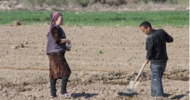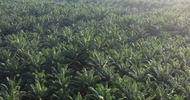Land grabbing has affected an estimated 400,000 Cambodians since 2003, helping to create a sizable under class of landless villagers with no means for self-sustenance.
Demand for the lucrative oil is increasing and land in the main exporting countries of Malaysia and Indonesia is quickly running out, so companies are now looking to the hot, humid countries along the Equator in West Africa.
Smithfield Foods won national security clearance on Friday for its proposed $4.7 billion sale to a Chinese meat processor, overcoming one of the biggest obstacles to a takeover.
- New York Times
-
06 September 2013
Civil society organisations appeal for suspension of MIFEE project in Papua pending redress for local communities
Commissioner for Agriculture of Nigeria's Edo State says his government gave 10,000 hectares to Ekha Chemical Company two weeks ago for cassava production, while two other companies have asked for 25,000 hectares each for palm oil and rice.
- Daily Trust
-
29 August 2013
The bill's pricing rules would oblige developers to pay up to four times the market rate for land in rural areas and twice the rate in urban areas. Displaced people must also be given homes and jobs.
A meeting called to address the problems facing Karuturi flower farm in Naivasha, Kenya, was cancelled. The farm directors who had flown in from India kept off the venue of the meeting due to the anger of union officials and the farm workers
In 2001, more than 4,000 people were evicted from land in Uganda after it had been acquired by a German coffee firm on a 99-year lease. The company insists the deal was above board, but an NGO is now raising doubts
- Deutsche Welle
-
27 August 2013
At least 200,000 people blocked roads and launched protests across Colombia against free trade agreements, land grabs and other policies of poverty and privatization pushed by US-backed right-wing President Juan Manuel Santos.
- Common Dreams
-
26 August 2013
Farmers in Burma have drawn up a list of 17 demands they plan to submit to legislators in a bid to amend the country’s land laws and provide greater protection against forced evictions.
Canadian billionaire Ned Goodman holds an 83% stake in Blue Goose Capital Corp. – the largest organic beef operator in North America that produces not only organic beef, but poultry and fish as well.
Mr Clinton said that some farmers had told him sadly that a few foreign investors came to their land claiming to have large agriculture investment capacities but their projects collapsed after a short period.
- Tanzania Daily News
-
07 August 2013
"For instance, SAGCOT targets to help 100,000 farmers in all regions it operates. Nothing is said about 38 million farmers in Tanzania!" says the head of the Network of Farmers’ Groups in Tanzania (Mviwata)
- The Citizen
-
07 August 2013
Some of the factors influencing grain yields are natural, while others are of human origin. Natural conditions of inherent soil fertility, rainfall, day length, and solar intensity strongly influence crop yield potentials. Several areas of cropland with inherently high fertility are found widely scattered around the world: in the U.S. Midwest (often called the Corn Belt), Western Europe, the Gangetic Plain of India, and the North China Plain.
Land reform movements, organizations of indigenous peoples, small farmers, and other citizens are responding to the increased sacking of land and other natural resources throughout the global South.
Rising demand for agricultural commodities has led to a ‘land grab’ in some of the world’s poorest countries. The International Bar Associaiton assesses the legal implications and the prospects for the developing world.
An international peasant workshop billed “Global Landgrabbing, Genuine Land Reform and Human Rights” concluded that lands in underdeveloped countries are being grabbed at an alarming rate by multinational corporations
Push to lure foreign investors has led to a rise in social problems, sparking fears of a return to conflict, warns NGO
A new report, ‘Who Is Benefitting?', examines the impact on local communities of large land leases held by three investors in Sierra Leone.
As election nears, government's land policies have become a campaign issue
- Wall Street Journal
-
25 July 2013
China's biggest state-owned agricultural conglomerate has bought farmland and port facilities in Western Australia and the move has sharply divided responses.
World Bank says its 10-step plan for land reform will enable African countries to end ‘land grabs,’ grow more food, and transform their development prospects.
Sifca Group, which owns Africa’s biggest palm-oil refinery located in Ivory Coast, said it plans to spend $417 million in the next five years on plantations and factories in Ghana, Nigeria and Liberia.
Among the estimated 3.7 million workers in the industry are thousands of child laborers and workers who face dangerous and abusive conditions. Debt bondage is common, and traffickers who prey on victims face few, if any, sanctions from business or government officials.
Villagers from Koh Kong, Cambodia claim they are losing their livelihoods to plantations that supply Tate & Lyle
Steep growth in Chinese olive oil consumption, unlikely to be met soon by a budding domestic supply, is encouraging investors to get hold of olive farms and processing plants in producing countries.
China's Legend Holdings went on a buying binge, both at home and abroad, taking over a blueberry farm in Qingdao, a kiwi fruit company in Sichuan Province and five Chilean fruit companies.
Weeks before a Chinese conglomerate agreed to buy Smithfield Foods Inc. in the largest such takeover of a US business, Missouri lawmakers quietly approved legislation removing a ban on foreign ownership of agricultural land.
NBPOL, a medium-sized Papua New Guinnea-based company, has eyed barangay Sta. Teresa as the pilot test area and demonstration farm for palm oil.
On 29th May, farmers in the Polish Region of West Pomerania organised a protest against land grabbing.















